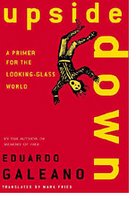Upside Down: a brief book review
 A couple of months ago on my mundane site I mentioned I was reading a few books. One of them was Eduardo Galeano's Upside Down: A Primer for the Looking-Glass World. A few books managed to jump the queue but I finally did get back to my list and finished Galeano's eloquent and tongue-in-cheek diatribe against imperialism, and the many false assumptions about north and south and rich and poor. I recommend this to anyone interested in justice and our responsibilities to each other, the animals and the environment that we are a part of, world-wide.
A couple of months ago on my mundane site I mentioned I was reading a few books. One of them was Eduardo Galeano's Upside Down: A Primer for the Looking-Glass World. A few books managed to jump the queue but I finally did get back to my list and finished Galeano's eloquent and tongue-in-cheek diatribe against imperialism, and the many false assumptions about north and south and rich and poor. I recommend this to anyone interested in justice and our responsibilities to each other, the animals and the environment that we are a part of, world-wide.Sometime shortly after my sister started taking university psychology courses she announced, "depressed people see the world more clearly." Not the greatest thing to remember, and I assure you I have many more fond memories of my childhood years with my sister, but that comment has stood the test of time. Now, I don't believe it as an excuse to be bummed out all the time but I do believe it is important for us to have an accurate understanding of what's going on out there, in our backyards and all over the world.
The picture Galeano paints is not of his imagination but of the world he sees, as a formerly-exiled journalist and citizen who is still crazy enough to believe in truth, liberty and justice. The book is arranged as a faux-study plan with chapter headings such as "The Teaching of Fear," "Lessons for Resisting Useless Vices," and "Crash Course on Incommunications." Galeano's style is subtle yet shocking. He deftly exposes not conspiracy theories but open horrors perpetrated in the name of God, democracy, the free-market and order.
Different than his previous history-focussed works, Upside Down sheds light on current and recent issues. He touches on the hypocrisy of the politicians of the north, the cowardice of the politicians of the south, neo-liberal globalization, mass media control, crime, poverty, war and environmental devastation. The world is at once ugly and beautiful, desolate and hopeful. Paradox is not lost on Galeano and he manages to capture the beauty and humanity of the poor and disenfranchised.
With awareness comes responsibility and was I ever thankful for the last two chapters that discussed previous attempts at bringing about justice, lessons to be learned and hope for the future. Galeano writes, "In the language of Castile (Spanish), when we want to say we have hope, we say we shelter hope. A lovely expression, a challenge: to shelter her so she won't die of the cold in the bitter climate of these times."


3 Comments:
Another way to talk about sheltering hope is to say that "I hold space for hope." Crafting and holding spaces (Open Space, BOLT, etc) in which we can cultivate hope, optimism and leadership to antidote the horrors that Galeano documents.
I hope to eventualy read this book also. After I finish all these other damn books. Reading is fun :)
Chris - I agree. Our people need hope. It seems like such an obscure and intangible thing but so vitaly important.
Dustin - You have time my friend...
Post a Comment
<< Home